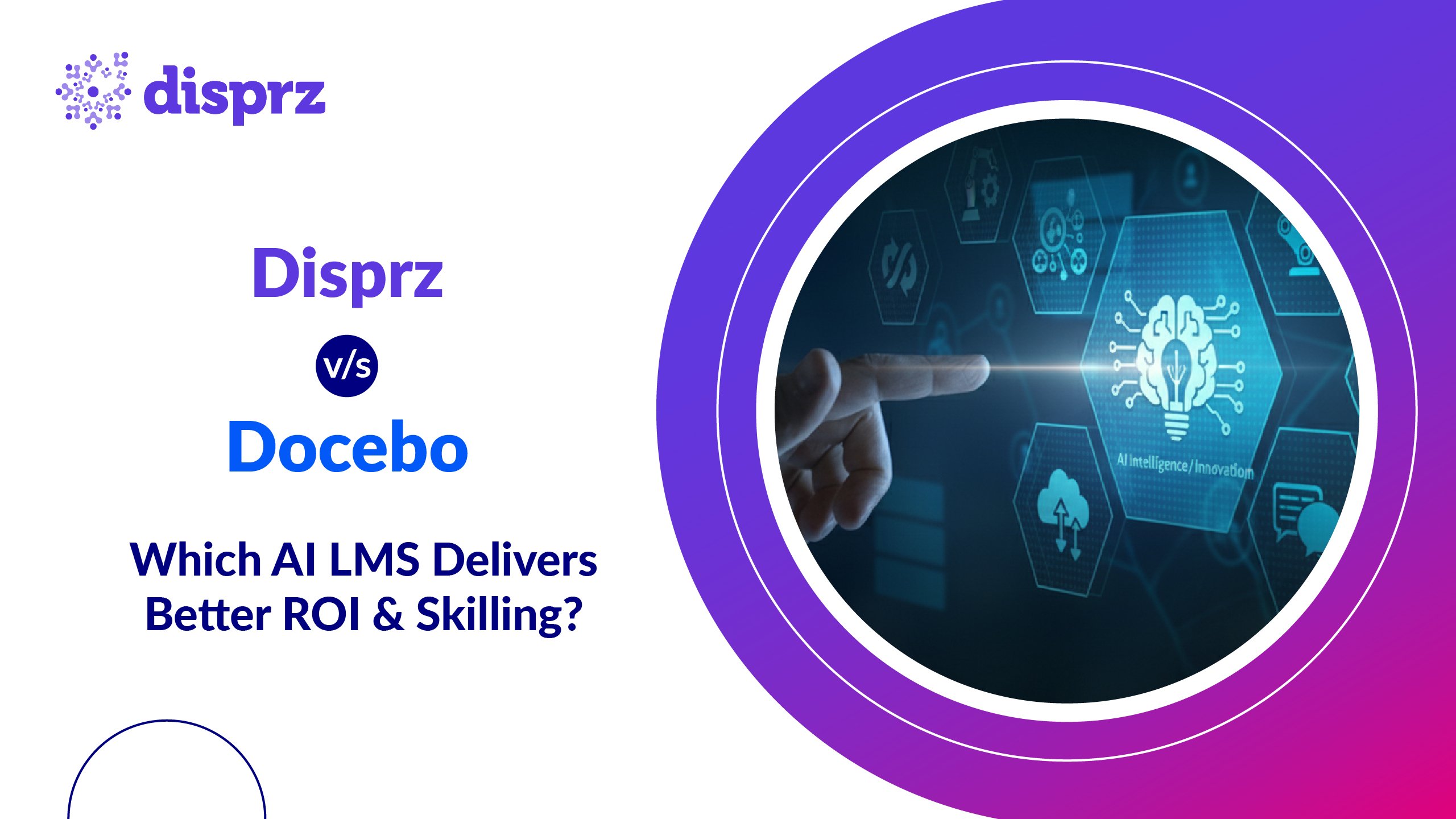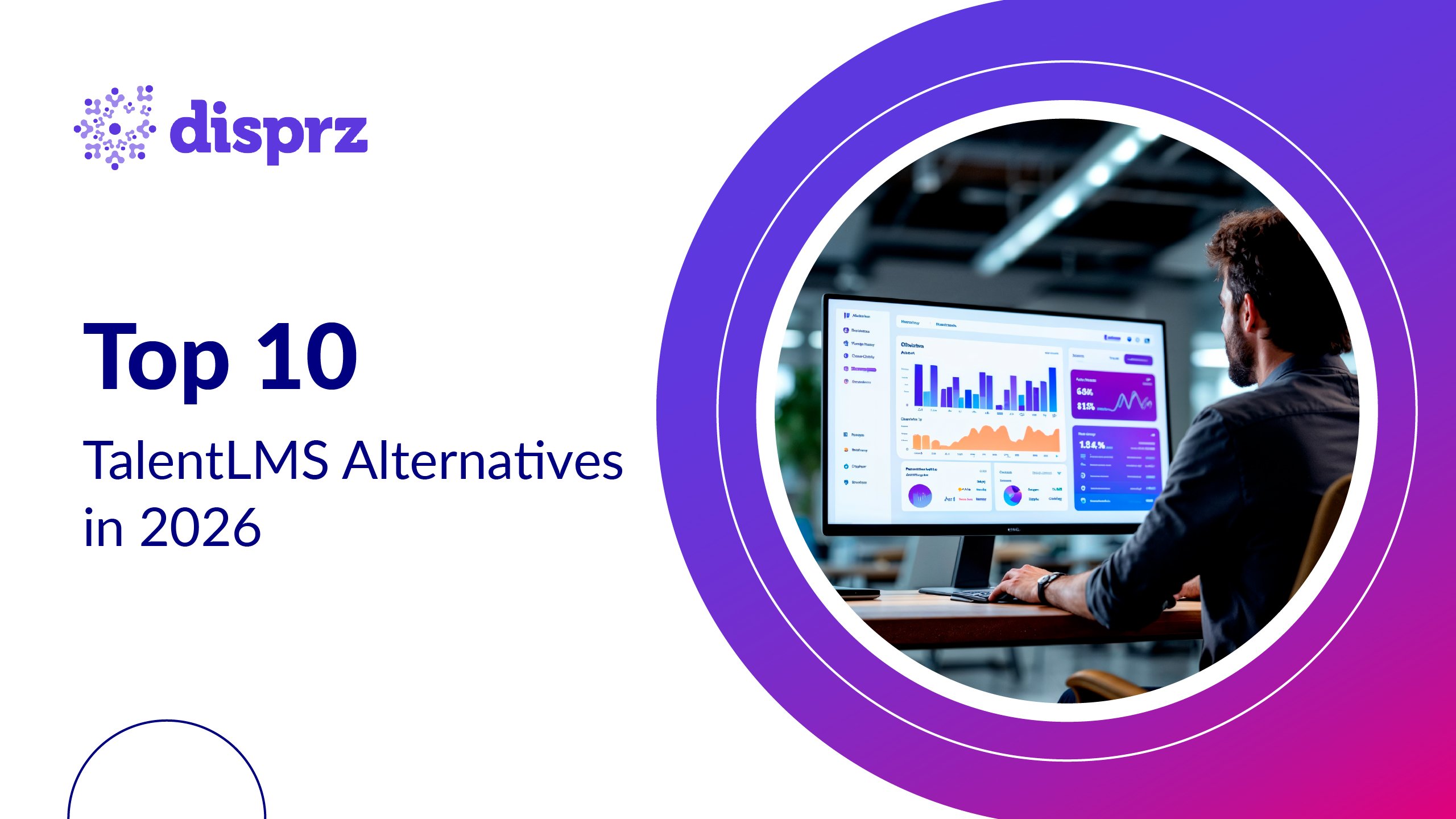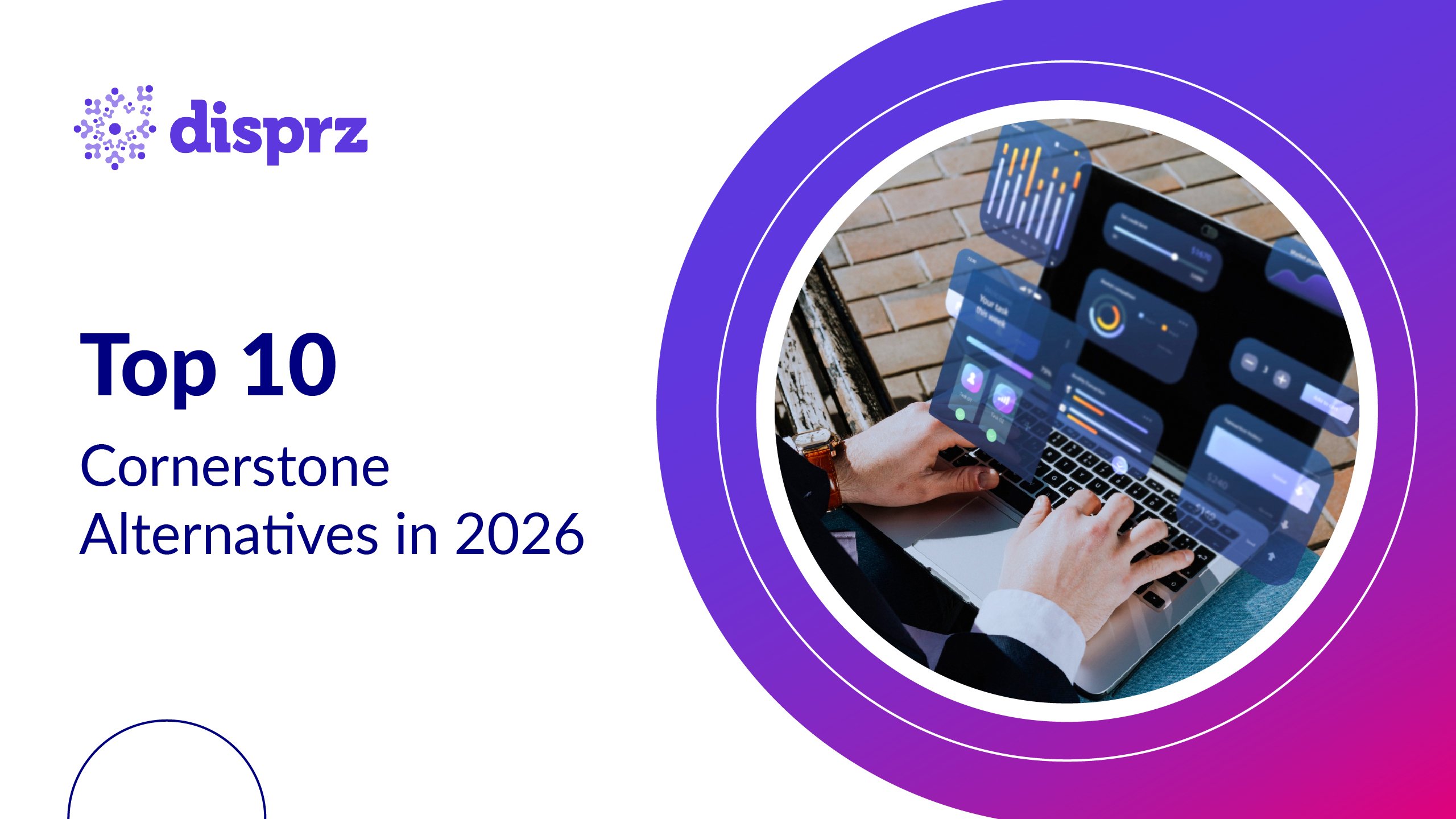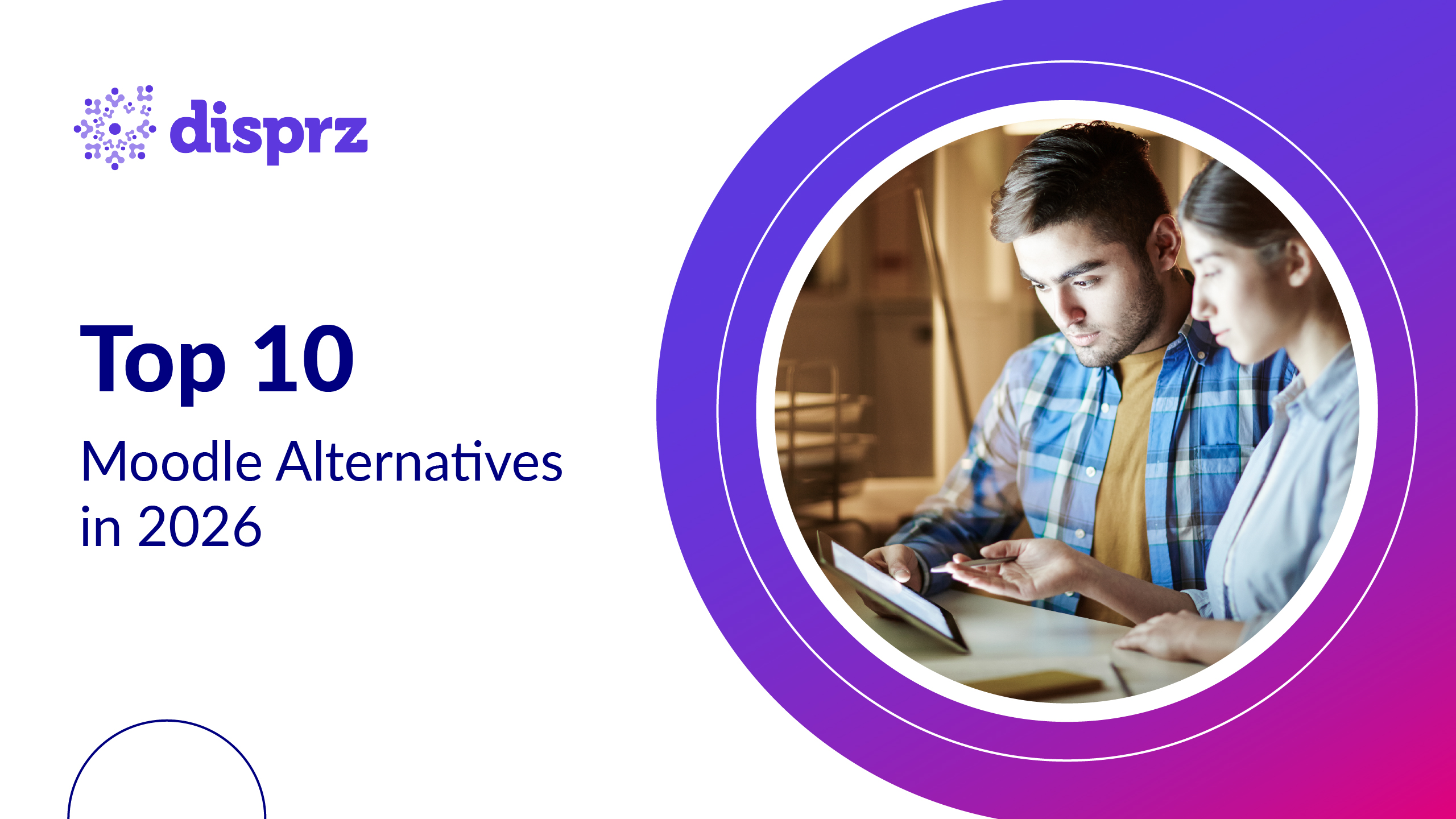Choosing between Disprz and Docebo in 2025 comes down to one key factor: whether your enterprise prioritizes AI-driven skilling, frontline readiness, and ROI-linked learning outcomes. Docebo is a well-established global LMS known for its strong content management, course delivery, and enterprise-grade integrations.
Disprz, on the other hand, is built as a skills-first, AI-powered LMS for 2026 and beyond, designed to bridge capability gaps, deliver personalized role-based journeys, and drive measurable productivity uplift.
With deep strengths in India, UAE, KSA, and wider emerging markets, Disprz stands out for frontline and mobile-centric learning, multilingual support, skills analytics, and faster implementation.
Disprz vs Docebo: Snapshot Comparison
Choosing the right LMS begins with a clear, side-by-side comparison of what each platform offers. This snapshot table gives you a quick view of how Disprz and Docebo differ across core categories such as AI capabilities, mobile readiness, skills intelligence, pricing, and regional strengths.
Use this comparison as a high-level guide before diving deeper into each platform’s detailed features and use cases.
| Category | Disprz | Docebo |
|---|---|---|
| Platform Type | AI-powered, skills-first learning & frontline enablement platform | Enterprise LMS focused on content delivery and learning management |
| AI Capabilities | Advanced skills intelligence, role-based recommendations, personalized journeys, AI-driven content creation & skill gap analysis | AI for content suggestions, automated tagging, limited skills intelligence compared to Disprz |
| Mobile & Frontline Learning | Purpose-built mobile app, offline learning, microlearning, strong adoption across frontline-heavy industries | Mobile app available but not fully optimized for distributed and frontline workforce needs |
| Skills & Pathways | Deep skills mapping, capability academies, role-based pathways linked to business outcomes | Competency structures available but less integrated with real-time skills analytics |
| Implementation | Faster deployment, hands-on support, strong configuration flexibility | Longer implementation cycles for complex enterprise use cases |
| Localization & Support | Strong in India, UAE, KSA; robust multilingual support & regional customer success teams | Strong global presence, but limited localization depth for India/UAE frontline-heavy enterprises |
| Pricing | Transparent and scalable pricing for mid-large enterprises | Premium pricing for advanced modules and add-ons |
| Ideal For | Enterprises focusing on skilling, frontline readiness, and ROI-driven learning | Enterprises needing a traditional LMS with strong content management |
What is Docebo?
Company Overview
Docebo is a global enterprise learning management system (LMS) founded in 2005 and headquartered in Canada. The platform is widely recognized for its strong content management capabilities, scalability, and modern cloud-based architecture.
It is used by mid-market and large enterprises across technology, manufacturing, retail, and professional services. Docebo is positioned as a mature LMS built to centralize training delivery, streamline learning operations, and support formal learning programs.
Core Capabilities
.jpg?width=1622&height=915&name=Docebo-%20Core%20Capabilities@2x-100%20(1).jpg)
Docebo provides a modular LMS ecosystem designed to support content distribution, formal learning workflows, and manager-driven development. Its feature stack is built to help organizations deliver structured, scalable training programs across global teams.
Key capabilities include:
-
Course authoring and content libraries: Docebo offers built-in tools to create courses quickly, along with access to a wide catalog of ready-made content. Organizations can blend custom modules, third-party courses, and microlearning assets to build diverse training paths.
-
AI-assisted content recommendations and automated tagging: The platform uses AI to recommend relevant learning materials based on user behavior and job roles. Automated tagging speeds up content organization, making it easier for learners to discover training aligned with their needs.
-
Learning paths and certification management: Admins can create role-based learning journeys that guide learners step-by-step. Docebo also simplifies the management of certifications and compliance requirements with automated renewals, reminders, and audit-friendly documentation.
-
Enterprise reporting dashboards: Its analytics suite provides dashboards that track learner progress, course completions, engagement levels, and skill development metrics. These insights help organizations monitor program effectiveness and make data-led improvements.
-
Integrations through Docebo Connect and popular HRIS systems: With Docebo Connect, companies can streamline data flow by connecting the LMS to HRIS platforms, talent tools, identity systems, and productivity apps. This ensures automated user provisioning and seamless learning operations.
-
Social/community features for peer learning: The system supports collaborative learning through discussion boards, Q&A features, and user-generated content sharing. These elements help foster peer-to-peer knowledge exchange and increase overall engagement.
While Docebo includes AI capabilities, its core strength lies in delivering structured training, compliance-focused programs, and unified learning workflows; rather than deep skills intelligence or talent development analytics.
Primary Use Cases
Docebo is best suited for:
-
Enterprises running large-scale compliance and formal learning programs.
-
Organizations need global training standardization.
-
Companies with diverse content needs across multiple departments.
-
HR and L&D teams prioritizing traditional LMS features such as catalog management, certifications, and blended learning.
Its strength lies in delivering a polished, enterprise-grade LMS experience with configurable modules, making it a strong choice for organizations that prioritize structured training delivery.
What is Disprz?
Platform Overview
Disprz is an AI-powered, skills-first learning and skilling platform designed for enterprises that want to build capable, future-ready workforces. Unlike traditional LMS platforms, Disprz integrates learning, skilling, and performance into one unified ecosystem.
The platform enables organizations to map role-based skills, identify gaps, deliver personalized learning pathways, and measure the business impact of skilling initiatives. With a strong mobile foundation and deep frontline enablement capabilities, Disprz is used extensively across retail, BFSI, telecom, and large distributed workforce environments.
AI-Driven Skilling Capabilities
.jpg?width=1622&height=915&name=Disprz-%20AI%20Skilling%20Capabilities@2x-100%20(1).jpg)
Disprz differentiates itself through an advanced AI engine that powers the full lifecycle of skilling; from diagnosing workforce capabilities to delivering personalized learning and measuring skill outcomes. Unlike traditional LMS platforms, Disprz is purpose-built to drive capability building at scale.
Key capabilities include:
-
Automated skill mapping and AI-generated skill frameworks: Disprz automatically maps roles to relevant skills using its proprietary AI models and industry benchmarks. It can generate complete, customized skill frameworks for each function or job family, eliminating the manual effort typically required from HR and L&D teams.
-
Personalized learning pathways based on role, performance, and behavioral data: The platform synthesizes multiple data sources (including role requirements, performance reviews, and behavioral insights) to curate learning journeys tailored to each employee. This ensures every learner receives training aligned with their unique growth needs.
-
Skill gap analysis with prescriptive learning recommendations: Disprz continuously identifies individual and team-level skill gaps through assessments, on-the-job performance data, and manager feedback. The AI then recommends targeted courses and interventions that directly address these gaps, accelerating proficiency.
-
AI-generated content, quizzes, and microlearning modules: The built-in content AI helps organizations rapidly produce high-quality learning materials. Whether it’s creating micro-courses, scenario-based assessments, or quick refresher modules, Disprz enables faster content creation without dependency on large instructional design teams.
-
Skill proficiency tracking linked directly to business KPIs: Disprz combines learning data with operational and performance metrics to measure how skill development impacts real business outcomes. Leaders can track proficiency levels, improvement trends, and capability readiness at both individual and organizational levels.
-
AI-based coaching nudges and workflow-integrated learning: Through intelligent nudges delivered across daily work tools, Disprz reinforces learning habits and provides coaching prompts at the moment of need. This ensures learning isn’t limited to the LMS; but embedded in the flow of work.
This positions Disprz as a true AI-powered LMS for 2026, built not only to deliver content but to drive measurable capability transformation and workforce performance improvement.
Regional Strengths
Disprz has strong market penetration and proven success across India, UAE, KSA, and key Asian emerging markets. Its advantages include:
-
Localization depth across multiple Indian and Middle Eastern languages.
-
Regional customer success teams with deep domain expertise.
-
Compliance with local hosting, data residency, and enterprise security standards.
Proven Track Record
-
Retail: High adoption across large electronics, FMCG, and fashion retailers—boosting productivity and store performance.
-
BFSI: Widely used by banks, NBFCs, and insurance companies for sales readiness and regulatory training.
-
Telecom: Supports large distributed field teams with mobile-first learning, assessments, and skill tracking.
How Are Disprz and Docebo different?
While both Disprz and Docebo are leading enterprise learning platforms, they take fundamentally different approaches to AI, skilling, and workforce enablement. Understanding these differences is crucial, especially if your organization is prioritizing frontline performance, regional scalability, or measurable ROI from learning investments.
The sections below break down how each platform compares across AI depth, mobile readiness, implementation speed, and suitability for emerging markets.
How Does Their AI Approach Differ?
Disprz: Built as a skills-first AI ecosystem, Disprz uses AI not only for content recommendations but for the entire skilling lifecycle (skill mapping, pathway creation, gap analysis, proficiency tracking, and KPI-linked ROI measurement). AI also generates microlearning content, quizzes, and nudges to drive continuous capability building. It is designed for enterprises looking for measurable skill uplift and productivity outcomes.
Docebo: Docebo’s AI focuses on automating content tagging, content suggestions, and improving search relevance. It enhances learning operations but does not offer deep skills intelligence, job-role mapping, or ROI-linked skill measurement at the level Disprz provides. Its AI is strong for content efficiency but lighter for capability-building.
Which Is Better for Frontline & Mobile Enablement?
Disprz clearly leads in frontline learning with a purpose-built mobile app, offline learning modes, measurable skill proficiency tracking, and high adoption across retail, BFSI, and telecom field teams.
Docebo supports mobile learning but is primarily designed for structured LMS programs rather than dynamic, on-the-job frontline enablement.
Who Wins in Skills Analytics & ROI Tracking?
Disprz is built around skills analytics, providing heatmaps, gap reports, progression dashboards, and business KPI linkages (sales uplift, productivity improvement, time-to-proficiency).
Docebo offers strong LMS reporting dashboards but lacks deep skill-gap intelligence and ROI attribution.
What About Implementation & Integration?
Disprz offers faster implementation, stronger onboarding support, and flexible configuration tailored to emerging-market workflows.
Docebo’s implementations are robust but can be longer, especially for global enterprises with complex content and certification workflows.
Which Fits Regional and Emerging Markets?
For India, UAE, KSA, MENA, and APAC emerging markets, Disprz provides better localization, better mobile adoption, and stronger regional customer success teams.
Docebo has a global footprint but does not offer the same depth of regional language support and frontline-oriented workflows.
Proof Points: ROI and Analyst Recognition
Evaluating an LMS goes beyond features. Real impact is proven through outcomes, adoption, and independent validation. Disprz stands out with measurable ROI across large enterprises and strong analyst recognition for its AI-driven, skills-first approach.
The proof points below highlight how Disprz delivers tangible business results in India, the UAE, and other emerging markets, backed by credible performance data and industry accolades.
Case Study (India BFSI)
A leading Indian banking and financial services institution used Disprz to streamline sales readiness and build role-based capability pathways across thousands of frontline employees. By mapping skills for priority roles and delivering targeted microlearning, the bank achieved:
-
32% improvement in product knowledge scores.
-
25% reduction in time-to-productivity for new hires.
-
Higher compliance completion rates, especially in remote and branch-light markets.
This translated into measurable gains in customer conversions and frontline performance.
Case Study (UAE Retail)
A major UAE consumer electronics retailer modernized its frontline skilling with Disprz’s mobile-first learning and AI-driven role pathways. Within months, the company recorded:
-
58%+ uplift in sales performance across priority categories.
-
4x net ROI driven by improved in-store conversions.
-
High adoption across 200+ store roles due to personalized journeys and on-the-job learning.
This positioned Disprz as a preferred skilling partner for large GCC retail enterprises.
Analyst Mentions
Disprz continues to gain recognition from global learning and HR analyst communities for its skills-first approach and measurable business impact.
Analysts highlight Disprz for:
-
Strong mobile learning capabilities.
-
Deep skills intelligence architecture.
-
Practical workflows for distributed and frontline teams.
-
Rapid implementation and enterprise-grade scalability.
Recognition
-
Featured by Gartner in multiple reports covering learning, skilling, and talent development innovation.
-
Rated highly on G2 for ease of use, customer support, and mobile learning.
-
Ranked as a leader in categories such as Mobile Learning, Skills Management, and Frontline Enablement.
Disprz and Docebo: Pros & Cons
Before choosing between Disprz and Docebo, it’s important to weigh their strengths and limitations side-by-side. Both platforms serve different learning maturity levels and organizational needs, but their capabilities vary significantly; especially in AI-led skilling, frontline readiness, and regional support.
Below is a balanced look at the key pros and cons of each platform to help you make a more informed decision.
Disprz Pros
-
AI-powered, skills-first architecture designed for role-based capability building.
-
Superior frontline and mobile learning with offline mode and high adoption rates.
-
Deep skills analytics with gap heatmaps, KPI-linked ROI dashboards, and proficiency tracking.
-
Strong localization for India, UAE, KSA, and emerging markets.
-
Faster implementation with high-touch onboarding and tailored configurations.
-
A unified ecosystem that integrates learning, skills, performance, and capability academies.
Disprz Cons
-
More specialized for skill-led organizations; may feel advanced for companies seeking a simple LMS.
-
Smaller global footprint compared to Docebo's enterprise presence.
-
Some advanced modules (skill academies, AI assessments) may require change management for adoption.
Docebo Pros
-
Mature enterprise LMS with global adoption and strong brand recognition.
-
Robust content management with libraries, certifications, and blended learning.
-
AI features for content tagging, recommendations, and search optimization.
-
Modular ecosystem that scales well for compliance and formal learning.
-
Extensive integrations with HRIS, CRM, productivity, and ERP platforms.
Docebo Cons
-
Limited skills intelligence compared to Disprz.
-
Not purpose-built for frontline adoption or mobile-heavy environments.
-
Higher pricing for advanced modules and enterprise add-ons.
-
Longer implementation cycles for complex multi-department setups.
-
Weaker localization depth for India, UAE, and KSA frontline-heavy enterprises.
Which Platform is Right for You?
Choosing between Disprz and Docebo comes down to your organization’s learning maturity, workforce structure, and skilling priorities. While both platforms deliver strong enterprise learning capabilities, they are built for different outcomes; Disprz focuses on AI-driven skilling and frontline performance, whereas Docebo excels in structured LMS workflows and formal training management.
The points below will help you identify which platform aligns best with your digital learning goals for 2025 and beyond.
Choose Disprz if:
-
You want a skills-first, AI-powered LMS that drives measurable capability uplift.
-
Your workforce includes frontline or distributed teams that need mobile-first, on-the-job learning.
-
You operate in India, UAE, KSA, or emerging markets and require strong localization.
-
You want deep skills analytics with gap insights, proficiency tracking, and KPI-linked ROI measurement.
-
You need faster implementation with high-touch regional customer success support.
-
You want a platform that unifies learning, upskilling, and performance insights under one ecosystem.
Choose Docebo if:
-
You need a traditional, enterprise-grade LMS with strong global adoption.
-
Your focus is structured training (certifications, content libraries, formal courses).
-
You want a modular platform that supports large-scale compliance and blended learning.
-
You primarily need content management, distribution, and LMS governance workflows.
-
Your organization is globally distributed and prefers a long-established LMS brand.
-
Deep skills intelligence is not a top priority, and standard reporting meets your needs.
Key Takeaways
Before deciding between Disprz and Docebo, it helps to understand the core differences that impact adoption, scalability, and long-term ROI. The takeaways below summarize the most important distinctions; especially around AI capabilities, frontline readiness, and regional fit.
Use these points as a quick decision guide to identify which platform aligns better with your learning strategy for 2025 and beyond.
-
Disprz excels as a skills-first, AI-powered LMS, making it ideal for enterprises focused on measurable capability building and ROI.
-
Docebo is a strong choice for traditional LMS needs, offering structured learning, content management, and global scalability.
-
For frontline and mobile-heavy workforces, Disprz provides significantly better adoption, offline learning, and role-based pathways.
-
Skills analytics and ROI tracking are stronger in Disprz, while Docebo performs well in content workflows and compliance training.
-
Enterprises in India, UAE, and emerging markets benefit more from Disprz’s localization, regional support, and mobile-first design.
-
The best choice depends on whether you prioritize AI-driven skilling (Disprz) or formal learning management (Docebo).
Conclusion
Choosing between Disprz vs Docebo ultimately depends on what your organization wants to achieve in 2025 and beyond. If your priority is AI-powered skilling, frontline readiness, and measurable business outcomes, Disprz offers a more modern, skills-first approach designed for fast-growing enterprises in India, UAE, KSA, and other emerging markets. Its strength lies in connecting learning with performance and enabling real capability transformation at scale.
If your organization needs a traditional LMS structure with strong content libraries, certification workflows, and global delivery, Docebo remains a reliable and well-established choice. The right platform is the one that aligns best with your workforce, your digital learning maturity, and your long-term talent development strategy.
Looking to transform your workforce with an AI-powered, skills-first learning platform? Book a personalized demo with Disprz and see how global enterprises are achieving higher adoption, faster time-to-productivity, and stronger ROI with Disprz.
FAQs
1) What’s the main difference between Disprz and Docebo?
The biggest difference is their core philosophy. Disprz is a skills-first, AI-driven platform designed to improve workforce capability, map role competencies, and link learning to measurable business outcomes. Docebo, meanwhile, is a traditional enterprise LMS focused on course delivery, certifications, and learning administration. Disprz prioritizes skilling and performance impact, while Docebo excels in structured training workflows. Your choice depends on whether you need capability building or classic LMS management.
2) Which LMS offers better AI capabilities?
Disprz offers deeper and more applied AI, powering skill gap analysis, automated role-based pathways, proficiency tracking, personalized content recommendations, and AI-generated micro-content. Its AI is built to enable continuous skilling and measurable improvement. Docebo’s AI focuses mainly on content tagging, search optimization, and recommendation workflows. While useful for efficiency, it lacks advanced skills and intelligence. For organizations prioritizing skilling, AI-led insights, and capability growth, Disprz clearly provides stronger AI functionality.
3) Which LMS suits India and UAE enterprises better?
Disprz is better suited for India and UAE because it offers deeper localization, multilingual support, region-specific workflows, and customer success teams based in these markets. It is widely adopted across BFSI, retail, telecom, and frontline-heavy sectors in the region. Docebo, while globally popular, does not offer the same depth of regional relevance or frontline optimization. For enterprises needing strong adoption in emerging markets, Disprz delivers a more tailored and impactful experience.
4) How long does implementation take?
Implementation timelines vary, but Disprz generally offers faster and more guided deployment, especially for organizations in India, UAE, and other emerging markets. Its onboarding is high-touch, with dedicated support teams ensuring alignment with role structures, skill frameworks, and frontline workflows. Docebo’s implementation can take longer due to its modular architecture and the complexity of configuring certifications, learning plans, and integrations. Enterprises seeking quicker time-to-value typically find Disprz easier and faster to launch.
5) Which LMS provides better ROI tracking?
Disprz provides stronger ROI tracking because it connects learning data with actual business outcomes; such as productivity uplift, sales performance, time-to-proficiency, and skill progression. Its dashboards include skill heatmaps, proficiency charts, and KPI-linked insights. Docebo offers robust LMS reporting but focuses more on course completion, engagement metrics, and certification data rather than capability improvement. Enterprises looking for clear visibility into how learning impacts performance and bottom-line results typically gain better ROI insights with Disprz.







